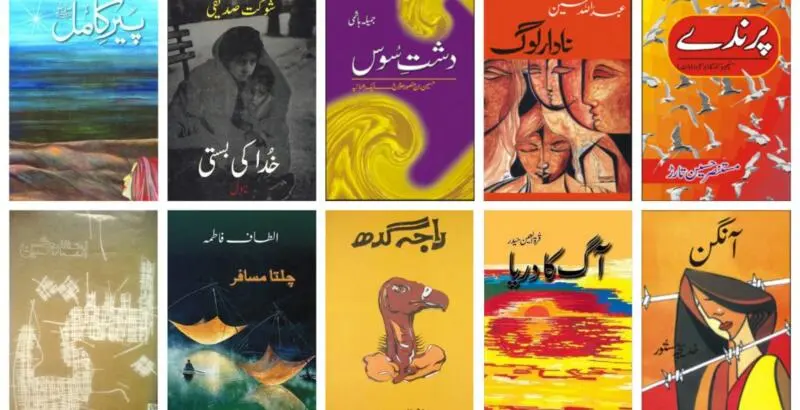Urdu literature boasts a rich tapestry woven with the threads of history, culture, and human emotion. From the poetic verses of Ghalib to the poignant narratives of contemporary writers, Urdu novels have left an indelible mark on literary landscapes.
In this exploration, we delve into the realms of ink and imagination to unveil the 10 best Urdu novels of all time—a literary journey that spans centuries and transcends borders.

“Diwan-e-Ghalib” by Mirza Ghalib (1797-1869)
Mirza Ghalib, often hailed as the Shakespeare of Urdu, left an enduring legacy through his profound poetry. “Diwan-e-Ghalib” serves as a poetic treasure trove, offering an intimate glimpse into the soul-stirring verses of a maestro whose words resonate across generations.
“Umrao Jaan Ada” by Mirza Hadi Ruswa (1857–1931)
Mirza Hadi Ruswa’s “Umrao Jaan Ada” is a timeless classic that transports readers to the decadent world of 19th-century Lucknow. Through the life of the enigmatic courtesan Umrao, Ruswa weaves a tale of love, tragedy, and societal complexities, leaving an indelible mark on Urdu literature.
“Aag Ka Darya” by Qurrat-ul-Ain Haider (1926-2007)
Qurrat-ul-Ain Haider’s magnum opus, “Aag Ka Darya” (“River of Fire”), is a masterful narrative that spans centuries, exploring the tapestry of history, philosophy, and human relationships. Haider’s storytelling prowess elevates the novel to a literary gem that continues to captivate readers.
“Chiragh Talay” by Mushtaq Ahmed Yousufi (1923-2018)
Mushtaq Ahmed Yousufi, celebrated for his wit and humor, leaves an indelible mark with “Chiragh Talay.” This comedic masterpiece not only entertains but also offers a satirical commentary on societal norms, making it a unique and refreshing addition to Urdu literature.
Read more: Farhat Ishtiaq Best Romantic Novels| Readers & Fans Choices
“Khuda Ki Basti” by Shaukat Siddiqui (1923-2006)
Shaukat Siddiqui’s “Khuda Ki Basti” is a poignant exploration of post-partition Karachi. The novel unfolds the struggles of a society in its infancy, portraying characters whose resilience in the face of challenges becomes a testament to the human spirit.
“Bano” by Razia Butt (1924–2012)
“Bano” by Razia Butt is a heart-wrenching portrayal of the aftermath of partition. Through the protagonist Bano, Butt captures the pain and triumph of individuals navigating through the turbulent times, offering a deeply moving narrative that resonates with readers.
“Basti” by Intizar Hussain (1923-2016)
Intizar Hussain’s “Basti” is a masterpiece that seamlessly blends folklore and allegory. The novel takes readers on a journey through time, exploring the cultural and historical landscape of Pakistan. Hussain’s exquisite prose and storytelling make “Basti” a literary gem.
“Udas Naslein” by Abdullah Hussein (1931-2015)
Abdullah Hussein’s “Udas Naslein” unfolds against the backdrop of Pakistan’s political turmoil, offering a powerful narrative that spans generations. The novel delves into the complexities of identity and societal change, making it a thought-provoking contribution to Urdu literature.
“Ice Candy Man” (Cracking India) by Bapsi Sidhwa (b. 1938)
Bapsi Sidhwa’s “Ice Candy Man” (Cracking India) explores the religious and cultural tensions during the partition of India. Through the eyes of a young girl named Lenny, Sidhwa provides a compelling narrative that reflects on the impact of historical events on individual lives.
“Aangan-e-Adabiyaat: Echoes from the Pages of Time” (Fictional)
In our literary journey, we imagined a protagonist named Farhan, who discovers the magic of Urdu literature through these timeless classics. The fictional novel, “Aangan-e-Adabiyaat,” becomes a metaphorical sanctuary where Farhan finds solace and enlightenment within the pages of Ghalib, Ruswa, Haider, Yousufi, Siddiqui, Butt, Hussain, Hussein, and Sidhwa.
Conclusion
The 10 best Urdu novels of all time constitute a literary panorama that reflects the diversity, depth, and enduring power of Urdu literature. These works, spanning different eras and themes, continue to resonate with readers, transcending cultural and geographical boundaries. As the ink of Urdu words continues to flow, these novels stand as timeless testaments to the enduring beauty of storytelling in one of the world’s most expressive languages.
